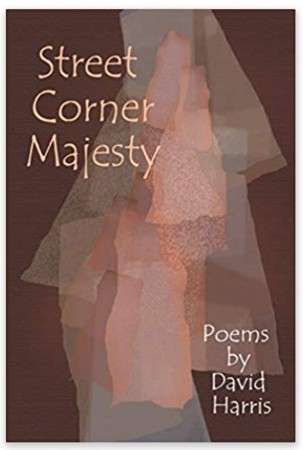For writers, publication of one’s first book often comes as a momentous accomplishment, a dream realized. Poet David Harris, long-time Street Sense contributor and alumnus of the writing workshops at Miriam’s Kitchen, achieved his breakthrough with the recent release of “Street Corner Majesty.”
“This is a book about a few years of my life,” he explains in “Majesty’s” introduction. “I chose to tell my story in poems as I lived through these experiences. The most interesting few years of my life began in winter 2001, when I found myself living on the streets of Washington D.C., cold, lonely, hungry and scared.”
“Majesty” is fundamentally a memoir, a recounting of street life’s trials, miseries and unexpected solace laid out in a vivid mosaic of 56 lyrical poems. They mainly portray the period from 2001 through 2004 when Harris’ “home” was the park benches and sidewalks of downtown Washington, D.C.
But the experiences recorded in “Majesty” are not the abstract, generic homelessness of sociology seminars and statistical studies. Harris weaves his words into an intimate tapestry of observations and reflections on life lived rough – and its emotional consequences.
Taken together, the poems reveal a vulnerability that comes from the painful recognition of how fragile the certainty and comfort “of many middle-class tomorrows” can be, and how badly one’s sense of identity can be battered when that certainty is lost.
In “Forgotten One,” Harris imagines the public’s revulsion: “A nuisance if not a menace,/a disgusting drunk lurking in an alley,/bothering you with my many needs,/cluttering your streets/as unsightly litter./ And in the rare moments/ when you toss me/ a ‘good morning’ or random smile/you don’t see the warmth that fills my heart.”
Harris’ work, however, is not limited to laments on the indignities of street life or elegies for lost possibilities and broken relationships. It includes Baltimore art galleries, bus trips through the Shenandoah Valley, art therapy exercises, and even the 2005 Bush Inaugural.
Several of “Majesty’s” poems grow out of Harris’ work with the National Coalition for the Homeless’ speakers’ bureau and leading reflective writing sessions for students in the Church of the Pilgrims’ service-learning programs. Harris serves as poet-in-residence with the church’s outreach program.
In “Thursday Evening,” for instance, he observes of students: “Tonight,/curious voices/are silent/as pens/ glide across/days of labor in steamy kitchens/amid the constant chilling voices/of need and hunger.”
Harris dedicates “Majesty” to “a few of my many muses,” several of whom appear in individual poems – including “Gift from Marina. ” “Tomorrow, she graduates/from four years/among the lost & desperate,/spreading the gifts of her strength & compassion/ among those lost in darkness” and “Pastel Ballerina.” “Meanwhile, my clumsy fingers/struggle to capture an image/I’m not there to witness or photograph./My child, in a distant room with a dozen others/practices ancient rituals of movement.”
Harris’ relationships with the other homeless men and women that he writes about are particularly poignant. For example, in the book’s introduction, Harris briefly mentions this. “After a couple of weeks on the streets, I met a lady, a veteran of homelessness, who told me about Miriam’s Kitchen.” That relationship, and what it meant to Harris, is captured in moving detail in “Kindness,” the three-page poem that closes the book.
“Next morning,/she rose/and took me on a tour/of her world-/here’s the park/where the vans come each evening,/packed with food;/here’s a church/providing weekday breakfast/for those like her and me;/here’s a toll-free number/where I can ask/a caring voice/for thick gray blankets.”
In “Small Blue Love Poem,” Harris reflects on various poets – Yusef Komunyakaa, Pablo Neruda, Lucille Clifton, and Sylvia Plath – that he read while living on the streets, and ends with this wish: “grind my bones/into ink/so some unborn poet/can write across/the wide white sky/This is love.”
Happily, whatever may become of Harris’ bones, that hypothetical future poet now has “Street Corner Majesty” to turn to for insight and inspiration. The book is available at amazon.com.




